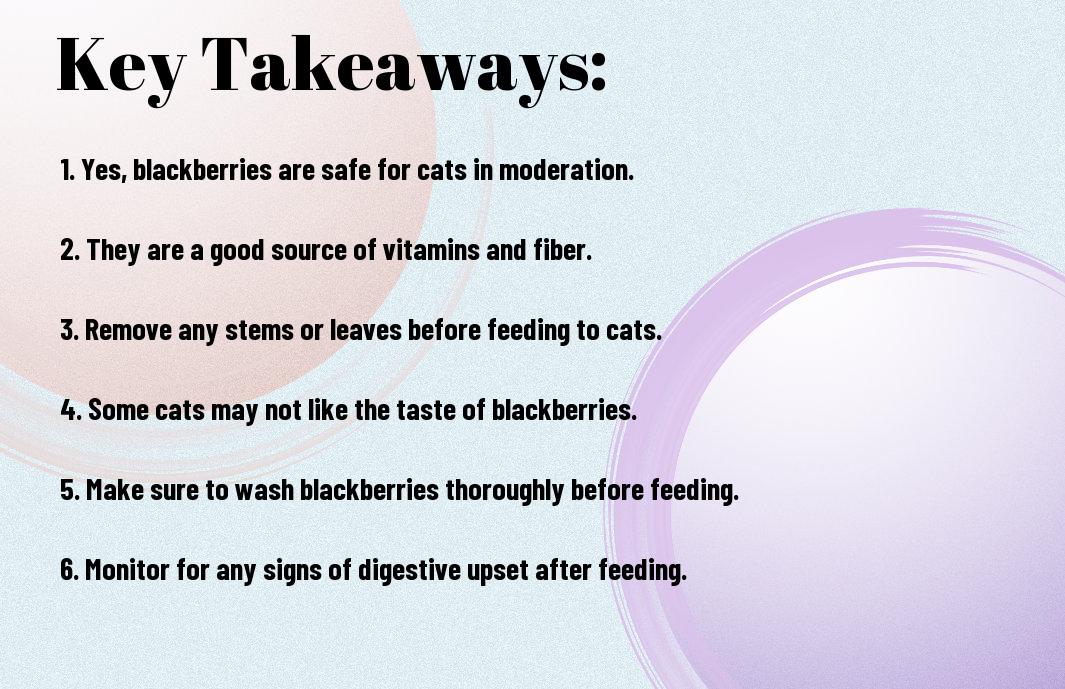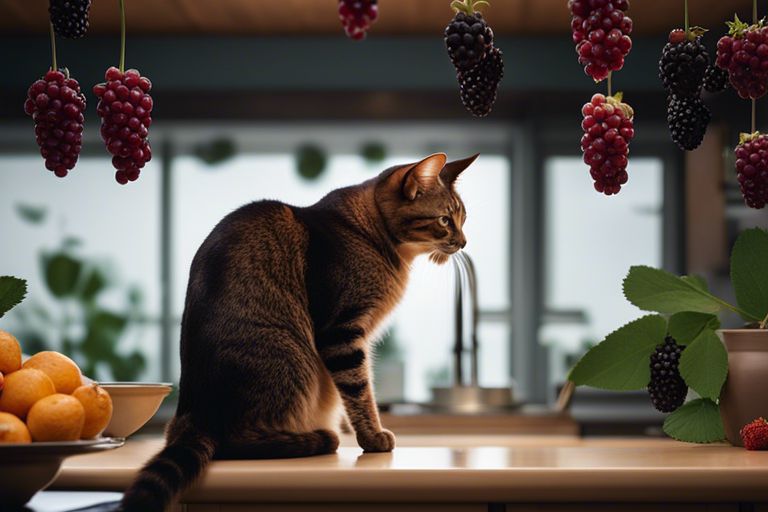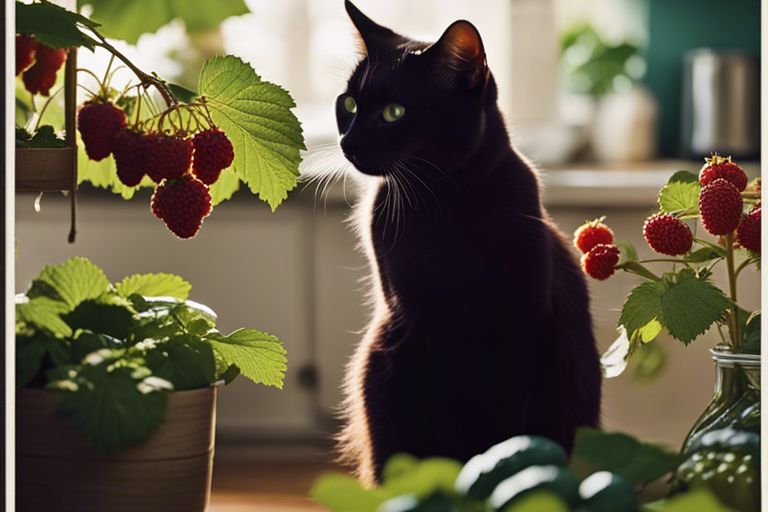Indeed, many cat owners ponder over the safety of feeding blackberries to their feline companions. While blackberries are safe for cats to eat, there are certain considerations to keep in mind. Blackberries are rich in antioxidants, vitamins, and fiber, which can offer numerous health benefits to your cat. However, there are also potential risks such as choking hazards and digestive issues that may arise if not given in moderation. In this blog post, we will delve into the question of whether or not cats can eat blackberries, and explore the potential benefits and dangers associated with this popular fruit.

Nutritional Profile of Blackberries
While blackberries are a delicious and nutritious treat for humans, many cat owners wonder if these fruits are safe for their feline friends. In order to understand whether blackberries are a suitable addition to your cat’s diet, it’s important to examine their nutritional profile.
Key Vitamins and Minerals in Blackberries
Any responsible pet owner knows the significance of essential vitamins and minerals in their pet’s diet. Blackberries are a good source of Vitamin C, Vitamin K, and manganese. These nutrients play a critical role in maintaining the overall health and well-being of cats. Vitamin C is particularly important for a cat’s immune system and can help boost their overall health. Meanwhile, Vitamin K is essential for blood clotting, and manganese is crucial for bone development and metabolism. Incorporating blackberries into your cat’s diet can provide a natural source of these vital nutrients.
Antioxidants and Fiber Content
The antioxidant and fiber content in blackberries also make them a potentially beneficial addition to your cat’s diet. The antioxidants found in blackberries, such as anthocyanins and ellagic acid, can help protect the cells from damage caused by free radicals. Additionally, the fiber in blackberries can contribute to healthy digestion and prevent constipation in cats. However, it’s important to remember that while these nutrients can be beneficial for your cat, moderation is key. Too much fiber can lead to stomach upset in some cats, so it’s best to offer blackberries as an occasional treat rather than a regular addition to their diet.
Content: When offering blackberries to your cat, it’s important to ensure that they are fully ripe and thoroughly washed to remove any potential pesticides or residues. As with any new food, it’s always recommended to introduce blackberries gradually and observe your cat for any adverse reactions. Additionally, remember that while blackberries can provide some nutritional benefits, they should not be a substitute for a balanced and species-appropriate diet for your cat.
Can Cats Safely Eat Blackberries?
Obviously, as a responsible pet owner, you want to ensure that the food you give to your feline friend is safe and beneficial for their health. Blackberries are a popular fruit enjoyed by humans, but can they be safely consumed by cats? Let’s take a closer look at whether blackberries are a suitable addition to your cat’s diet.
Potential Health Benefits for Cats
Potential health benefits for catsIn moderation, blackberries can offer some potential health benefits for your cat. Blackberries are rich in antioxidants, vitamins, and fiber, which can contribute to your cat’s overall well-being. Antioxidants help to combat free radicals in the body, while vitamins can support various bodily functions. Meanwhile, the fiber content in blackberries can aid in digestion and promote a healthy gastrointestinal system for your feline companion.
Risks and Precautions
Any new food introduced to your cat’s diet should be approached with caution, and blackberries are no exception. While blackberries can provide certain health benefits, they should be given to your cat in moderation. Too many blackberries can lead to digestive upset or diarrhea in cats due to their high fiber content. Additionally, the seeds of blackberries can pose a choking hazard or cause intestinal blockages if consumed in large quantities.
Risks and PrecautionsWhen offering blackberries to your cat, it’s important to wash the fruit thoroughly to remove any potential pesticides or contaminants. Always remove the stems and any leaves before serving blackberries to your cat to avoid any potential toxicity or digestive issues. As with any new food, monitor your cat for any adverse reactions after consumption, and consult with your veterinarian if you have any concerns.

Feeding Guidelines for Cats
Unlike dogs, cats have different nutritional requirements and digestive systems. It is important to follow specific feeding guidelines to ensure the health and well-being of your feline companion.
Recommended Serving Sizes
Cats have small stomachs and are designed to eat small, frequent meals throughout the day. When it comes to feeding blackberries or any other treats, it is important to remember that they should only make up a small portion of your cat’s diet. Too many blackberries or any fruit can lead to digestive upset and potential weight gain. Stick to small, bite-sized pieces and only offer them occasionally as a special treat.
Frequency and Moderation
An important factor to consider when feeding blackberries or any other human food to your cat is moderation. While blackberries can provide some nutritional benefits, they should not make up a significant portion of your cat’s diet. Any treats, including blackberries, should be given in moderation to avoid any potential health issues.
Any changes to your cat’s diet should be discussed with your veterinarian to ensure that they are receiving the proper nutrition and not consuming anything that could be harmful to their health. Consult with your vet before introducing blackberries or any new food into your cat’s diet.

Alternative Fruits and Treats
Your cat’s diet doesn’t have to be limited to just blackberries. There are a variety of fruits and treats that you can offer to your feline friend. If you’re interested in finding out more about what your cat can eat, you can read this thread about cat picking and eating blackberries!
Safe Fruit Options for Cats
Options like blueberries, strawberries, and watermelon can be a safe and tasty treat for your cat. These fruits are low in calories and can provide essential nutrients like vitamins and antioxidants that can support your cat’s overall health.
Additionally, small pieces of apple or pear can be a delicious and nutritious option for your feline friend. Just be sure to remove any seeds or pits as they can be harmful to your cat.
Fruits to Avoid in a Cat’s Diet
Any fruits that contain pits or seeds, such as cherries, peaches, and plums, should be avoided as they can be a choking hazard or contain toxins harmful to your cat. In addition, citrus fruits like oranges and lemons can cause digestive issues for your cat and should not be included in their diet.
As a responsible pet owner, it’s important to remember that while some fruits can be safe for your cat to eat, it’s crucial to research and monitor their intake to ensure their well-being. If you’re unsure about a specific fruit, it’s best to consult with your veterinarian before introducing it into your cat’s diet.
Can Cats Eat Blackberries? Is It Safe For My Cats?
Drawing together the information presented, it is generally safe for cats to eat blackberries in moderation. Blackberries can provide essential nutrients and fiber for your feline friend, but they should be given sparingly. It’s important to remove any stems or leaves and wash the berries thoroughly to ensure they are safe for consumption. Additionally, it’s essential to monitor your cat for any signs of allergies or negative reactions to blackberries. Always consult with a veterinarian before introducing any new foods into your cat’s diet to ensure their safety and well-being.
FAQ
Can cats eat blackberries?
Yes, cats can eat blackberries in moderation. Blackberries are non-toxic to cats and can provide them with essential nutrients such as fiber, vitamins, and antioxidants.
Is it safe for my cats to eat blackberries?
Yes, it is generally safe for cats to eat blackberries. However, it is important to introduce new foods to your cat’s diet gradually and in moderation to avoid digestive issues. It is also crucial to wash the blackberries thoroughly to remove any pesticides or chemicals that may be harmful to your cat.
Are there any potential risks of feeding blackberries to my cats?
While blackberries are safe for cats to eat, they should be offered as an occasional treat and not as a staple in their diet. Cats can be sensitive to new foods, and some may experience gastrointestinal upset if they consume too many blackberries. Additionally, the seeds of blackberries can be a choking hazard for cats, so it is best to mash or puree the blackberries before offering them to your feline companion.

Hello there, I am Iftekhar Ahmed. I am the owner of Mishka & The Cat Corners. I love to explore and write on various topics about cats

